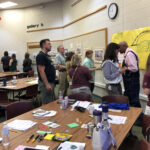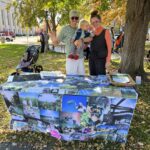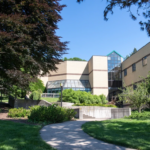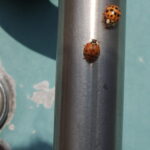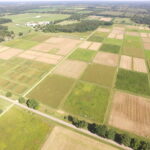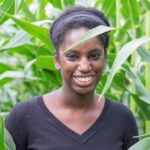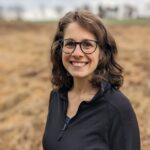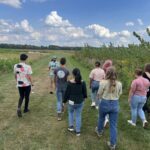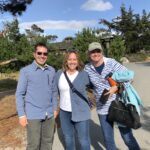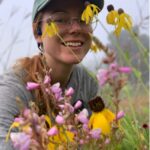Hickory Corners, Mich. — Teachers and informal educators of K-12 students are invited to engage in science teaching professional development this summer at the W.K. Kellogg Biological Station. The 24th annual K-12 Partnership Summer Institute is set for 9 a.m. to 3:30 p.m. Tuesday, June 20, through Thursday, June 22. Registration is now open! This year’s theme is “Our Changing Planet, Classrooms to Ecosystems,” and will include scientific talks by Dr. David Karowe, Dr. Lauren Sullivan and Naim Edwards. Each morning’s science talk will be followed by a series of interactive and
Area educators invited to Kellogg Biological Station K-12 Partnership’s Summer Institute
DreamScene Placemaking: Artists-in-Residence 2022
Anna Lee Roeder and Erik Vasilauskas are the husband and wife team behind DreamScene Placemaking in Kalamazoo, and our 2022 KBS LTER Artists in Residence. They visited KBS twice during their Residency in 2022. For their first visit in the spring, they stayed with us for a week and toured KBS, visited our long-term experiments, and met with scientists, students, and staff. In the fall, they presented a brownbag seminar on the development of their artistic styles and how the residency fit into that trajectory. As a product of their residency, Anna and Erik engaged the KBS summer
KBS commitment to to fostering an inclusive culture garners accolades from MSU
W.K. Kellogg Biological Station’s dedication to making diversity, equity, inclusion and social justice central to KBS culture has earned an Excellence in Diversity, Equity and Inclusion unit award from Michigan State University. The award focuses on the work of the KBS Culture and Inclusion Committee, or CIC, and its 2022 membership: Among the examples of KBS’s contributions to advancing diversity, equity and inclusion were the formation of the CIC, a focus on diverse hiring and recruitment practices, creation of a DEI advocate position, and the development of programming aimed at
Similar invasive insects coexist through slight differences in environmental responses
Novel analyses of a 31-year dataset on invading ladybeetles shows that small differences in habitat preference across years allow for two similar invading species to coexist while native species decline. Invasive species lead to novel interactions Invasive species are one of the main threats to biodiversity in an increasingly interconnected world. As humans move organisms around, either purposefully or incidentally, new combinations of species have the opportunity to interact with one another. These novel interactions have the potential to affect an invader’s persistence in the
KBS Long-Term Ecological Research program awarded $7.65 million NSF grant
The W.K. Kellogg Biological Station Long-Term Ecological Research program at Michigan State University recently received a renewal of its foundational grant from the National Science Foundation, reaffirming its future and status as one of the country’s premier research sites. Established in 1989, the KBS LTER is one of 28 NSF LTER sites nationally and is the only one dedicated to understanding the ecology of agricultural systems. With a focus on row crops, the 34-year-old program studies how agriculture can be environmentally friendly without harming yields. A renewal
Article featuring KBS research wins outstanding paper award
A paper that examines best practices for improving soil health over time has been recognized as outstanding by the American Society of Agronomy, or ASA. The paper, spearheaded by W.K. Kellogg Biological Station resident faculty and MSU assistant professor Christine Sprunger, detailed research that was conducted at the KBS Great Lakes Bioenergy Research Center site. Tvisha Martin and Meredith Mann also contributed to the paper, titled “Systems with greater perenniality and crop diversity enhance soil biological health,” which was originally published in 2020 in the journal Agricultural
Welcoming the new LTAR Associate Director for Engagement, Tayler Ulbrich
The W.K. Kellogg Biological Station (KBS) community is excited to welcome Dr. Tayler Ulbrich, who is joining the KBS Long-term Agroecosystem Research (LTAR) project as the new Associate Director for Engagement. In her new role, Tayler will be responsible for directing and managing external relationships with various groups - such as producers, agribusiness professionals, farm advisors, policy makers, journalists - to ensure that the goals and outcomes of the LTAR reflect the many voices of people within Michigan’s agricultural sector. Tayler grew up in Iowa and moved to Michigan
KBS LTER helps prospective biological science grad students envision the field
The second annual Envision EEB event was held Sept. 16-17, 2022, and this year W.K. Kellogg Biological Station hosted a tour that gave a glimpse into life as a grad student in the Ecology, Evolution and Behavior—EEB—program. The Envision EEB: Graduate Preview Weekend provides students from underrepresented backgrounds information on the graduate application process and how to fund their graduate research through grants and fellowships. It also offers an early opportunity to network with potential advisors. About the program The weekend, which was held in person this year after
Building relationships by the ocean
Britney Christensen, Gabe Knowles, and Connie High joined the KBS community through the NSF LTER RET Program (National Science Foundation’s Research Experience for Teachers). This program matches K-12 teachers with local scientists with the goal of enhancing the professional development of K-12 science educators through research experience in order to then bring new knowledge into their classroom. Their experience culminated with a visit to Asilomar, California to attend the LTER Network's All Scientists Meeting in 2022. The following post is written by Britney, Gabe, and Connie, along
The ABC’s – Agriculture, Beneficial Beetles and Conservation: Reflections from an LTER Fellow
Cynthia Fiser is a graduate student in Doug Landis's lab in the Michigan State University Department of Entomology. Her research looks at the impact of perennial prairie strips on the dispersal of ground beetles in row crop agriculture. Rolling hills of wheat, corn and soybean are a beautiful and nostalgic feature of the summer landscape in the Midwest. Here, agriculture is as much a part of the culture as the economy – anyone who attends a county fair would agree! However, the pressure placed on our agricultural landscapes to meet global demands for food, fuel and fiber takes a toll on
- « Previous Page
- 1
- 2
- 3
- 4
- …
- 17
- Next Page »
